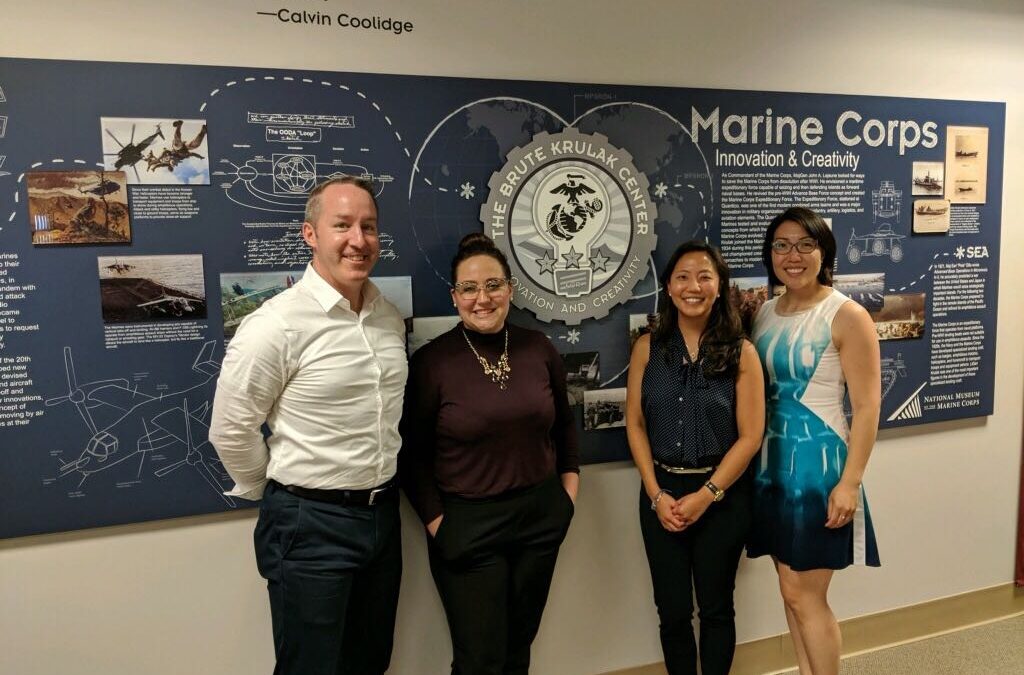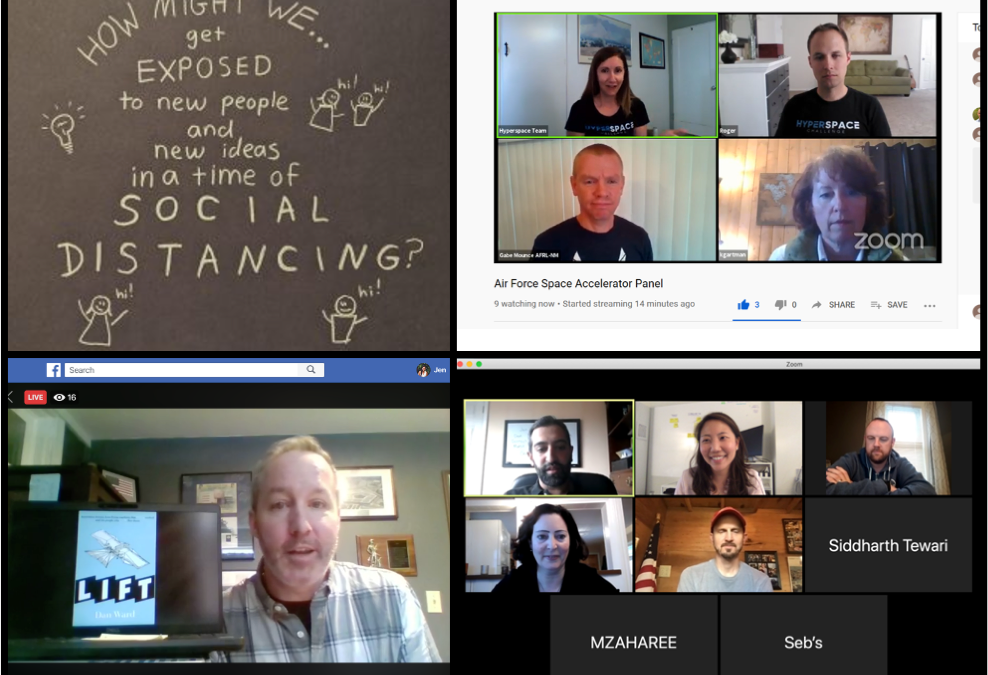
by choij | Sep 30, 2019 | Success Stories, Team Toolkit
Hot. Muggy. Humid. Like a swamp (but not really).
Yep, I’m talking about DC summers. The time when tourists and summer interns descend en masse upon the District, and the locals grumble about these visitors mistakenly standing on the left side of the metro escalators.
But now that the kids have gone back to school, the mornings have a brisk chill, and the green trees are starting to show their first yellow leaves, it’s time for us summer lovers to accept the inevitable: Fall is coming.
With any change in seasons, it’s a prime time to reflect on the past season to savor the good moments and make course corrects for the next one.
For me, my favorite ITK summer memory was by far our “ITK DC Roadshow” to bring our Innovation Workshop to the National Academy of Sciences, the National Academy of Public Administration, and the US Marine Corps Brute Krulak Center for Innovation and Creativity.
Based on their interest and unique requests, Team Toolkit developed a custom Innovation Workshop that took participants on a lightning round lesson on three ITK tools (Problem Framing, Value Proposition Canvas, and Culture Change Canvas). They learned how to use these tools and applied them for current problems with us there to guide them.
It was an absolute delight working with such engaged and dynamic participants: We were truly impressed by their eagerness, their hunger for innovation, and their willingness to try something different.
And we learned so much from them too! We found fellow comic makers and problem framing enthusiasts, and our own perspectives and world views were positively widened from our workshop conversations.
But the best part was the “Train the Trainer” portions of our workshop: Rather than being only a participant, we invited our audiences to also become co-conspirators of innovation by teaching them how to lead the use of these tools on their own teams without us.
Let’s let that soak in a bit… remember the saying about the man and the fish?
Give a man a fish, and you feed him for a day.
Teach a man to fish, and you feed him for a lifetime.
Yes, that one. By teaching our audiences how to use ITK tools, and the practices and mindsets behind them, we created the first of hopefully many future cohorts of co-conspirators.
We at Team Toolkit are passionate about democratizing innovation and believe that anyone and everyone can be an innovator. We created the ITK toolkit to provide tools and a structured process to help you get there faster because helping you ultimately helps all of us.
Have a question on the ITK tools? Want an ITK Innovation Workshop at your organization? Not sure where to start but know you want to?! Contact us! We’re here to help and can’t wait to connect with you.

by choij | Jun 17, 2019 | Interviews, Team Toolkit
As part of our ongoing effort to democratize innovation across the company, Team Toolkit has picked up a couple of new members and branched out to new locations. One of our new members is Melanie Shere, based in MITRE’s McLean office. I sat down with Melanie to learn a little more about her and formally introduce her to the community!
Jen: Welcome to Team Toolkit, Melanie! Can you tell us a little about yourself?
Melanie: I’m a Human Factors Engineer, in the User Experience, Visualization and Decision Support Department of the Software Engineering Tech Center. I focus primarily on human behavior, usability/accessibility and how interpersonal relationships are affected by different cultural factors and environmental influencers. Basically, I focus on why people make certain decisions and how we can incorporate different experiences more holistically, which is why design thinking is so appealing to me.
I began my career at MITRE Quantico 6 years ago and made my way to the McLean campus about 4 years ago. I have enjoyed furthering my education, as well as seeing the breadth of opportunity MITRE has to offer from different community and sponsor perspectives.
J: How did you first get involved with Innovation Toolkit?
M: I was invited to join through my Technical Director and Group Lead, who know that I enjoy interacting with others to help solve problems- whether that be complicated, large scale initiatives, or small short-term wins. They felt my personality and genuine knowledge would lend itself well to ITK’s mission. I also have a background in teaching, which I think makes me stronger in this space as well.
J: What’s your favorite part of ITK?
M: I like hearing about all the problems and seeing all the personalities in the room and trying to understand why people feel the way they feel. Usually, our ITK sessions involve people who are working on the same project, so they already know each other and have established dynamics. This is where ITK brings a cool perspective because we’re not emotionally invested as deeply “in the relationship” with the topic and can give advice objectively. We see a very high level snippet of the problem space, so we’re an unbiased opinion and just want to see them succeed; or take some strong steps forward to establishing what their overarching goals should/could be, which can include a plan forward on how to tackle them.
I also like working with challenging problems and people.
J: What do you like about working with challenging types of personalities?
M: My entire basis in education has been analyzing and understanding the way people think. When I’m facilitating an ITK session, I strongly believe in seeing diverse perspectives (regardless of whether I agree with them or not). When I hear other people’s thoughts on a problem or idea, it also helps me to re-evaluate my own line of thinking, making me a stronger, more well-rounded person, and better equipped to deal with other persons and problem spaces in the future. Even if I only take a small piece of a conversation away with me, and that causes me to change just a small subset of my thinking- that to me, has made me better. This is part of the type of service I hope others receive from ITK and what we provide. These diverse perspectives are important because they create a more well-rounded discussion, and in the end, a more complete answer to a tough challenge. The point of ITK is providing a more well-rounded, inclusive solution to our peers, and this type of embracement of diversity in thought is necessary for that.
J: What helps when working with these challenging personalities? Do you have an example?
M: One example was when I was facilitating an ITK session where the leader changed the goal of the session multiple times, which meant that I’d have to re-plan the ITK session multiple times because the different goals required different types of ITK tools. This made it “difficult” because this session required at least double the prep work of a regular session since I had to rework it- which also led me to be more nervous of whether I had suggested the right solution for the final work session.
I went into the session anxious, hoping that we would get the results from it that would provide some tangible actions for the group. What made a difference was continuing to have touchpoint meetings before the actual session, where we walked through the tools and expected flow. We agreed that the lead would help cover subject matter expertise in that vocation, and I would provide design thinking examples and explanations to the group, working together to make sure we were providing clear, and strong direction for the expectation of the session.
It was important to make sure we were on the same page before stepping in the room, and we worked together very well to deliver strong results from the ITK sessions we held- resulting in not only tangible, actionable outcomes, but strong conversation artifacts as well.
J: What is the most challenging part of working with people and ITK?
M: From an internal perspective, Bedford and McLean are different animals – we have different sponsors, different environments, and a different culture. ITK began in Bedford and has more presence there, whereas ITK is still gaining traction in McLean. Especially since I was the only McLean member until now, I’ve been willing to put in more time and effort because we’re still gaining ground here, and I see so much value in what ITK has to offer, so I am always looking for more opportunities to grow our work.
From an external perspective, the most challenging part is gaining sponsor buy-in early in the process. Internally, a lot of people are familiar with what ITK is. But as we work more with external sponsors, ITK and the design thinking process is new to them and they need more guidance on how we can help them, and that we can assist no matter where they are with their processes. Innovative thinking is beneficial no matter where you are in a project lifecycle and is not limited to a topic you are working on but can encompass things you may be curious about as well.
J: How would you describe your style of innovation?
M: No limits. Be creative. I look at the personalities in the room and try to play to their strengths and help them recognize and strengthen other people’s offerings to the conversation in the room as well. For example, when facilitating, I’ll mix a group of personalities and backgrounds to make sure the playing field is even, and they are gaining and understanding perspectives and concerns of others. The most holistic perspectives produce the most educated solutions.
J: Everyone has a favorite tool. Name yours and why?
M: I wouldn’t say I have a favorite tool per se… One of my favorite things to do with the tools is occasionally creating hybrid tools when we don’t already have a tool that fits the group’s needs. I like to research for other solutions and marry it with what tools we already have. ITK isn’t one size fits all, and I think customizing tools shows that I truly understand how those tools should be used [in the ITK session] and that I really understand the group’s problem space.
Customizing demonstrates this, and that we are truly providing them with a unique service. Sometimes, some groups just need a tool [and they can use it as-is], which is also just as effective depending on their problem space. But I like when I get the opportunity to give them a custom experience. And they definitely appreciate it.
J: What role does culture play in adoption of ITK methods?
M: In my experience so far and from what I’ve seen in McLean, the McLean culture is very business-process driven. People definitely expect tangible, actionable results after an ITK session and have to see the practical application of what we did to their overall mission. Sometimes though, just using the service to create a safe environment for difficult pivot project conversations or checking the pulse on an aspect you aren’t quite sure is still verging on goodness of work- is something I would love to see us do more of here.
J: What do you do when you aren’t working on ITK?
M: I’m currently working on a few internal projects and I also support a couple DoD efforts, and an IRS project.
Outside of work, I spend a lot of time with my husband and family, whether it’s going out to dinner, traveling, going out to a baseball game, or a show. I also enjoy baking, gardening, painting and my two cats, Maggie and Waffles. I spend a lot of time between Virginia and my family in Vermont as well. I also over the past 6-7 years have been very involved in historic preservation work, teach ethnographic perspectives in history education and have led a committee of 40 women, assisting in recruiting and training volunteers for 5 different historic properties.
J: If someone was interested in using the Innovation Toolkit, how would you suggest they get started?
M: First, figure out how they want to use ITK. If you don’t have anything particular in mind, (or if you do) check out the ITK website, check out some of the tool options, and see if any speak to them.
Second, I’d suggest setting up a meeting with someone on Team Toolkit (or reaching out to us via email) to learn more about how we can help and figure out what they need in their situation, or even if they just want to know more in general.
J: Any closing thoughts or do you have a favorite quote to share?
M: “Often when you think you’re at the end of something, you’re at the beginning of something else.” – Fred Rogers



